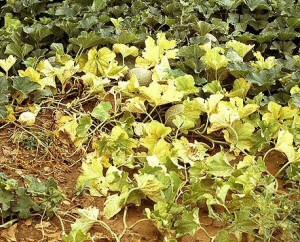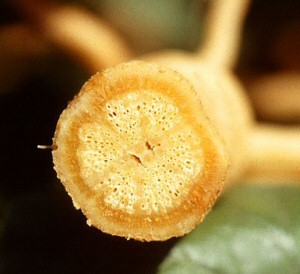Yellow Vine
 Causal Agent
Causal Agent
A bacterium, Serratia marcescens. The bacteria survives the winter in squash bugs and is spread to the young plants in the spring when the bugs colonize and feed on cucurbit crops.
Hosts
Curcurbits (cantaloupe, pumpkin, squash, and watermelon)
Symptoms
 Symptoms of the disease normally appear 10 to 15 days prior to fruit maturity and
are similar in cantaloupe, pumpkin, watermelon and squash. Leaves change from green
to lime-yellow, and then to bright yellow. Affected plants gradually decline and exhibit
a blighted appearance within 7 to 10 days. In some cases, immature plants may not
turn yellow, but wilt and collapse in 1 day. Fruit and flowers on affected plants
are not distorted, but watermelon fruit lose their chlorophyll very quickly. The distinguishing
characteristic of YV-affected plants is that the phloem, which normally has a clear
translucent appearance, becomes honey-colored, particularly in the crown area. Although
foliar symptoms of YV are similar to vine decline symptoms caused by soilborne pathogens,
root degeneration occurs only in the later stages of YV development.
Symptoms of the disease normally appear 10 to 15 days prior to fruit maturity and
are similar in cantaloupe, pumpkin, watermelon and squash. Leaves change from green
to lime-yellow, and then to bright yellow. Affected plants gradually decline and exhibit
a blighted appearance within 7 to 10 days. In some cases, immature plants may not
turn yellow, but wilt and collapse in 1 day. Fruit and flowers on affected plants
are not distorted, but watermelon fruit lose their chlorophyll very quickly. The distinguishing
characteristic of YV-affected plants is that the phloem, which normally has a clear
translucent appearance, becomes honey-colored, particularly in the crown area. Although
foliar symptoms of YV are similar to vine decline symptoms caused by soilborne pathogens,
root degeneration occurs only in the later stages of YV development.
Control
Please contact your local county extension office for current information.
